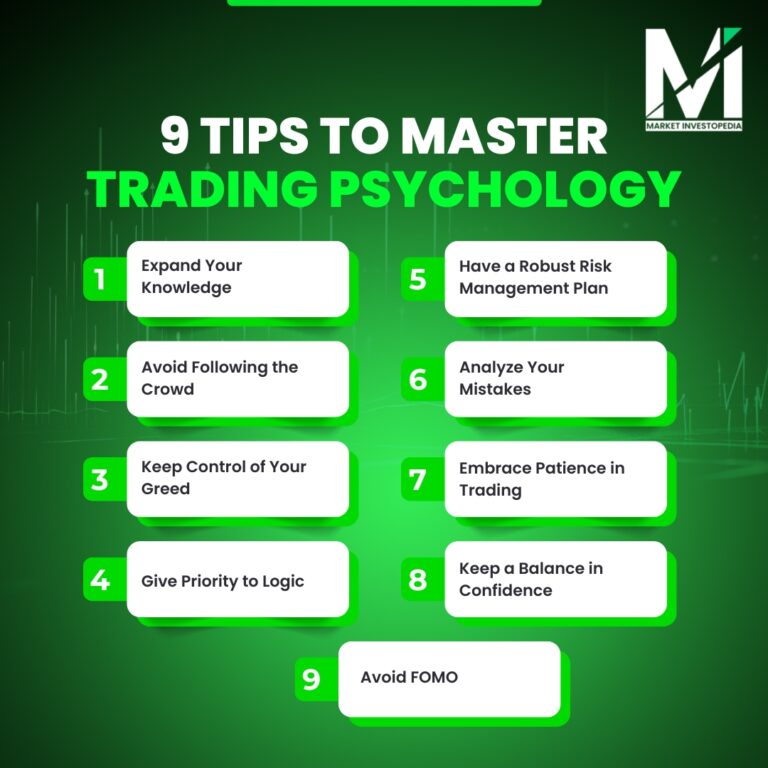Trading Psychology
Trading psychology is what makes you stand out in the financial market. Many people think money or skills are important in trading, but what is the most important? The answer is right mindset.
Psychology is underrated, and a novice does not understand its importance till they enter the real market. In this Market Investopedia blog, we will discuss trading psychology for beginners, why it is important for traders, and how to master trading psychology. So, let’s get started.
What is Trading Psychology?
Trading psychology is nothing fancy; it’s just keeping the right mindset while buying and selling assets. It involves embracing discipline, patience, and rule-based trading to have a balanced mental asset. By which traders can avoid emotions such as greed, fear, FOMO, anxiety, and stress to ruin their trading journey.

A quick glance
To master trading psychology, keep yourself disciplined, control your emotions, stick to a good plan and be patient. Taking time to reflect and write in a journal helps you avoid making decisions you might regret.
The 3-5-7 rule in trading requires you to take profits when your position reaches 3%, 5% or 7% gains. It allows traders to retain the profit made so far throughout the exchanges.
To solve your trading psychology issues, stay relaxed, avoid making decisions based on feelings, stick to your plan, accept losing as part of learning and think about the future, not fast results.
According to the 90% rule, 90% of traders lose 90% of their money within the first 90 days. It highlights the danger of trading when you do not have the right knowledge and attitude.
What is Trading Psychology?
Trading psychology is nothing fancy; it’s just keeping the right mindset while buying and selling assets. It involves embracing discipline, patience, and rule-based trading to have a balanced mental asset. By which traders can avoid emotions such as greed, fear, FOMO, anxiety, and stress to ruin their trading journey.
What is Trading Psychology?
Trading psychology is nothing fancy; it’s just keeping the right mindset while buying and selling assets. It involves embracing discipline, patience, and rule-based trading to have a balanced mental asset. By which traders can avoid emotions such as greed, fear, FOMO, anxiety, and stress to ruin their trading journey.
How Does Right Psychology Make a Difference
Let us understand the importance of the right psychology in trading with an example. There are two traders, A and B. Both have a capital of $1000. They decided to buy a stock worth $10, predicting that the price would rise. Almost every trader has analyzed that the stock is all set to rise in the upcoming days.
‘A’ believes in the rules, so A opens a position keeping a risk-to-reward ratio of 1:3 in mind. It means that the trade entry price will be $10, Stop loss: $8, and take profit: $13.
While ‘B’ believes in the market noise and increases the risk. B keeps the entry price at $10, stop loss at $5, and take profit at $15.
In this case, suppose the market turns against their prediction, and the price of the stock falls to $5. A’s total loss will be $200, and B’s total loss will be $500.
In the above, you can see that both A and B suffer a loss, but B almost lost half of its capital due to greed. That difference between loss is only because A believes in the right trading psychology and does not let greed affect the trade.
9 Tips to Master Trading Psychology
Want to become a trader with the right mindset like A? Follow the steps below to master trading psychology for beginners:

1. Expand Your Knowledge: Develop Your Brain
You will get the right mindset when you have knowledge. You may have seen that the knowledgeable people are the calmest. Even in the market, traders who have made millions will not say anything, but a new trader who has made a small profit will flaunt it all over.
That’s because market knowledge builds your personality in such a way that you focus on the process. Market knowledge will make you aware of not only the pros but also the cons of trading. It ultimately helps you stay in the right mindset, even in unfavorable market conditions.
2. Avoid Following the Crowd: Be the Master of Your Own Decision
When trading in any financial market, noise is common. You may see a rally for bullish or bearish trends in an asset. Novices, at this stage, end up following the noise instead of using market analysis. It leads to big losses that have a direct impact on your brain.
However, that’s where you need to change your approach. Following the crowd is never a good idea. Your trading decisions should be based on proper market analysis, not on what others are doing.
3. Keep Control of Your Greed: Never Keep Unrealistic Expectations
Trading involves money, and greed automatically enters the picture when there is money. However, little greed can destroy your entire trading journey and significantly impact your brain.
Unrealistic expectations lead to big losses, and many traders end up quitting at this stage. In trading, most people are attracted to get a 100% profit, double their return, or become a millionaire in one night. But these are just some common ways to lure new traders. A return of 10 to 15% is decent; anything more than that increases the risk and affects your mental state.
4. Give Priority to Logic: Say No to Impulsive Trade Decisions
What makes you trade is the most important thing in trading. Most people make trade decisions following others or due to FOMO or greed. However, the only time you should place a trade is when you have the right reason behind trading.
It can be a news or technical analysis indicator, finding, or market sentiment. But the reason should be logical. For that purpose, you can organize fundamental, technical, and sentimental analysis.
5. Have a Robust Risk Management Plan: Manage Risk to Manage Mindset
When you master the risk, you master the mindset. Risk is the element that affects the brain the most. In the trading world, there is no such thing as zero-risk or risk-free trading. However, you can at least keep the risk amount in control.
More risk, more stress. In order to avoid this stress, fix your risk-to-reward ratio, and never take a risk more than you can afford to lose. A risk-to-reward of 1:3 will help you keep the right trading psychology.
6. Analyze Your Mistakes: Identify Your Downsides
Ignoring your mistakes means missing the opportunities for improvement. A trader should regularly analyze the trading journey to assess the strengths and weaknesses. Remember, learning from mistakes is the best thing you can do to improve your trading.
And you can do so only when you know where you lack. So, analyze your trading journey, find your downsides, and take the necessary precautions to deal with them.
7. Embrace Patience in Trading: Trade Less, Wait More
The trading world tests your patience. You need to wait for the right opportunity, for your first profit, and then for being consistently profitable. Also, these things take time.
You may have seen many people getting overnight success in trading. But many sleepless nights are also behind the overnight success. Trading is about 80% waiting and 20% executing. So keep patience and focus on quality instead of quantity.
8. Keep a Balance in Confidence: Don’t Be Overconfident
Trading psychology for beginners requires a balance of confidence. It means that you need to believe in your trading plan, analytical skills, and decision-making ability. However, there is a fine line between being confident and being overconfident.
A belief that you are always right or that you can control the entire market can ruin your trading. So, keep a scope of your change and be ready to learn new things.
9. Avoid FOMO: Don’t Aim to Trade Every Opportunity
In the market, you will get thousands of opportunities to trade and make a profit. But can you trade each and every opportunity? Obviously not. Thus, don’t aim to trade each opportunity.
If you have missed the opportunity, the next opportunity falls your way. However, due to the fear of missing out, if you end up placing a wrong trade, you lose a significant amount.
Final Words
Well, having the right trading mindset may look simple, but it’s actually not. The things we have discussed look simple in theory; however, when it comes to practical application, these are the most difficult.
Your trading psychology will improve only when you start implementing the above rule in your trading plan. For a practical understanding of how to do so, reach out to attend our expertly designed trading psychology webinar for free.

